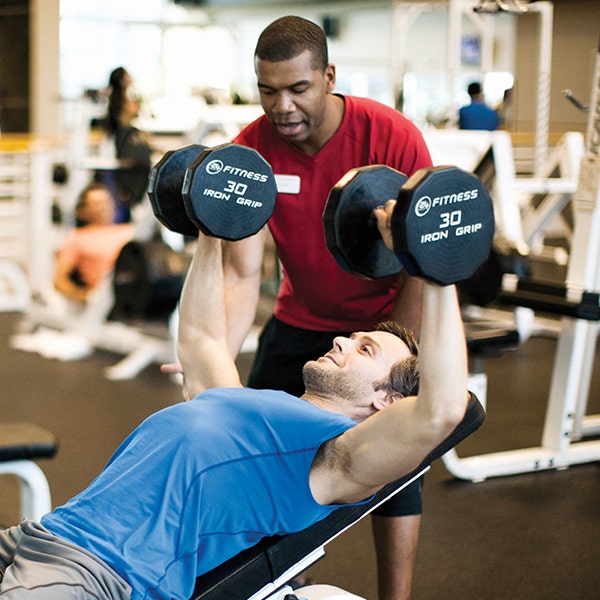First-timer’s Guide to Personal Training

Starting with a personal trainer is a commitment, and even once you’ve decided you want expert help to get to your goal, it can be intimidating if you don’t know what to expect. So we asked Josh Buchbinder, M.S., fitness manager at 24 Hour Fitness Parker-Arapahoe Super Sport in Aurora, Colo. to tackle some of the trepidation. Here’s his checklist for what to expect – and ask for.
1. Your trainer should be relatively fit. Yes, your trainer has probably made fitness a huge part of his or her life. While your trainer’s fitness level is important, it’s also not the only indicator of skill or approach, or a reason to work with someone or not. Your super-fit new trainer does not necessarily expect you to feel as strongly about training, at first, as he or she does – or to work at a level that’s going to hurt you. Likewise, your trainer could have a new baby at home and be struggling to fit a workout into his day. So you’ll be working at your level with help from someone who probably can relate to your experiences.
2. Clothes make the workout. I’ve had clients show up in jeans and a button-down shirt! You should expect to work at your first session (see #4 and #5). Style’s not important, but you’ll need comfortable athletic clothes and sneakers so you can move safely and without restriction.
3. Bring water. You won’t be struggling to finish your first session, especially if you’re new, but you will be doing work. Unless you’re taking trips to the water fountain to run out the clock on your workout, you’ll need your water bottle handy to help maintain proper hydration and body temperature levels, and reduce your recovery time.
4. There’s a test. Yes, you’ll be tested at your first session, meaning your trainer may have you do exercises, use some weights, or use cardio equipment in order to assess your movement and your capacity. He or she needs these insights to tailor a program for you to get results without injury. If you don’t get an assessment, get another trainer – it’s that important.
5. You shouldn’t be guessing and neither should your trainer. Whether it’s a high-level overview of what you’ll be doing for the next six months or a week-by-week break-down, your trainer should have an exact plan of attack after the initial assessment.
6. You could be sore, but you shouldn’t be sorry. Soreness is not an indicator of workout quality. In fact, it could indicate you were dehydrated or your trainer missed something in his or her initial assessment (see #3 and #4). It could also mean you or your trainer pushed too hard. A workout will cause some muscle soreness and stiffness, but it should not be disabling. (If you can’t sit down, walk up the stairs or play with your kids because you worked out, then what good is it?) That said, your training should progress, meaning it should get harder over time. If it’s too hard, don’t be shy about asking for adjustments. Your progress is the reason your trainer comes to work – we’re here to help you.
7. You should expect to have fun! Training should be fun, challenging and motivating. If your training session isn’t fun, why would you ever come back? Our job as fitness professionals is to help you realize your own potential, but if you don’t enjoy the process you’ll never find out what you can do, whether that’s lifting more, running faster, climbing or leaping higher or farther than you thought you could. Make sure you and your trainer are smiling even when the workout is grueling.